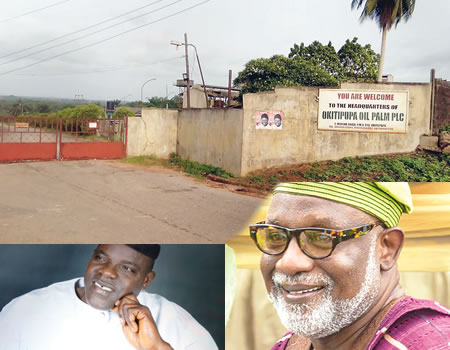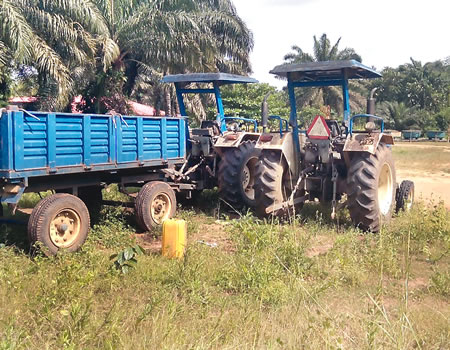For the moribund Okitipupa Oil Palm Company to survive and reclaim its forefront place in palm oil exporting, it requires the attention of the Ondo State government and other stakeholders to reverse the rot that has come to characterise the organisation. Hakeem Gbadamosi visited the plantation in Okitipupa and writes about the challenges confronting the 50-year-old company.
Okitipupa Oil Palm Company, located In the Southern senatorial district of Ondo State, specifically in Okitipupa Local Government Area, is one of the legacies of the first Premier of the old South Western region, Chief Obafemi Awolowo. The oil palm company, at the time, made the region second to none, after its establishment in 1976.
The oil palm industry, among many other agricultural establishments, served as source of economic revenue for the region before the discovery of oil in the country, a development, which seemed to relegate cocoa, palm oil and other agricultural products to the background. The discovery of oil in the Niger Delta drifted attention from agriculture to oil.
Okitipupa Oil Palm Company (OOPC) was established close to 50 years ago, 1968 to be precise, and took the lead role in the production of palm oil and palm kernel with other products such as crude palm oil, technical oil, pharmaceutical stern, seedlings ashes and brown soap.
The Okitipupa Oil Palm Company went on to place the country on the global map after it took off in 1968, making Nigeria one of the largest producers and exporters of palm oil in the world, and was said to account for over 80 per cent of the nation’s export revenue in its hey days.

Ondo State and Oboli, former special assistant to Mimiko.
A visit to the company by Nigerian Tribune revealed that the company which had over 10,000 staff strength at the time, and was a constant beehive of activities, has now become a shadow of itself. The largest plantation of about 10,468 hectares looked deserted as the only form of activity was what would have classified it as more or less a ghost town.
All attempts by Nigerian Tribune to move round the premises of the oil company was turned down by the security personnel at the entrance of the company as our correspondent was informed that all the management staff were not available to attend to him.
However, a source within the company, who pleaded anonymity told Nigerian Tribune that the company had not been produced since the new management took over the company. He, instead, alleged that the company was being used as a conduit to illegally siphon money and engage in corrupt practices.
He said: “illegal harvesters are being encouraged on the plantations. The illegal harvesters sell to private processing individuals around here without remitting the proceeds into the coffers of the company or government but into their private pockets. Many of us here are casual workers while those who are paid from the government coffers on monthly basis do nothing and hardly come to work.”
He lamented the corruption taking place within the company, noting that many of the palm trees in the plantations are old, with no measures put in place to plant new ones or replace the dying palm trees.
An octogenarian, who was a former employee of the OOPC, traced the state of the company to the era of military rule in the country. He attributed the present condition of the company to maladministration, which he said occurred during the military rule and which negatively affected the fortune of the palm oil company.
Aside the military, he recalled the effortS of the former Governor Olusegun Agagu to revive the company after its being comatose for about ten years. He said several efforts were made by the late Agagu when he resumed as the governor of the state to revive the moribund company. According to him, the company was privatised with an asset of about N750million but the company never survived due to corruption.
A former stakeholder of the company, who simply identified herself as Christiana, alleged that during the time of the Agagu administration, some modern equipments were procured for use in the company which she said turned out to be inferior and further worsened the woes of the company.
She said: “There were claims during the Agagu administration that five burners were procured from China at the rate of N2.3billion and three were given out to two other palm oil companies. The Ore -Irele Oil Palm Company was given two, while the one at Araromi -Ayesan was allotted one.”
She, however, said that investigation revealed thereafter that the five burners claimed to be imported and bought from China were manufactured locally by an engineer in Araromi Rubber Estate and the machine never worked for a month.
A source in Okitipupa, who also owns a private oil mill, explained that the immediate past administration of Olusegun Mimiko made some efforts to revive the company, when it was discovered that the five burners procured by its predecessor were substandard with the promise to repair them. He, however, observed that he was not aware of such repairs were eventually carried out.
He also explained that Mimiko government noticed that the method of production was crude and made efforts to raise the standard of production in the OOPC by procuring two palm kernel crackers for the company which he said was estimated about N250million each and also fruit pressing machines.
It was gathered that the Mimiko administration also procured 11 multipurpose tractors at the rate of N1.65billion, with five of the tractors allotted to OOPC while the three others were given to the other factories.
As part of efforts to raise production standard, the Mimiko government also was said to have also spent about N55million to purchase seedlings from Malaysia to develop the oil palm estate.
Another casual worker in the company dispelled the claim that the company spent about N5.2million on diesel on a monthly basis, as not only untrue but blatant lies. He said: “where is the diesel used and what is it used for? If that is true, that means there has been some sort of diversion of tax payers’ money. The only activity here is the selling of palm fruits to private millers.”
A casual worker, an agricultural economics graduate from Obafemi Awolowo University, appealed to the new governor in the state, Mr Rotimi Akeredolu, to beam its searchlight on the OOPC and rescue the company from its state of near inactivity before it goes moribund, by putting in place better management who can turn around the fortune of the oil palm company.
He expressed optimism that the OOPC, if given adequate attention, is capable of increasing the Internally Generated Revenue of the state. He also called on Akeredolu to look inward, urging him to give agriculture priority as the sector had a lot to offer the state in terms of revenue.
Nigerian Tribune, while on the visit to the company, noticed that no fewer than 500 private small scale oil palm processing setups were scattered around the area between Irele junction and Okitipupa town and most of them were fully functional with customers visiting them from across the country. One of the private operators lamented the state of rot at the OOPC, despite the huge investment of government and frantic effort of subsequent governments to restore life to the company.
Our reporter was directed to a former chairman of the investment wing of the Okitipupa Oil Palm Company, Chief Tola Akintemi, in Okitipupa but he was said to have travelled out of town.
In a related development, in a recent interview with a former Senior Special Assistant to former Governor Mimiko, Omoniyi Oboli, by a local newspaper, he confirmed the rot in the OOPC but said that the OOPC, if given necessary attention by government, was capable of employing at least 10,000 indigenes of the state who are in the labour market.
Oboli, while speaking on the challenges confronting the OOPC, said: “the challenges were enormous, from inherited creditors to boardroom conflicts. Others were accrued salaries and wages dating back to several months, neglect of the plantations and other facilities over the years, expired useful life of plantation and new planting regime.”
According to him, the life span of a palm tree on the OOPC plantations is about 44 years and noted that most of the trees in the estates were planted between 1955 and 1969, while by agricultural standard, the economic life span of palm trees is 25 years.
Oboli stressed the need to replace the palm trees. He said some efforts were made by the management and about 75,000 sprouted seeds from NIFOR were supplied freely to OOPC in November 2014 and were nurtured to maturity and said the planting was to continue based on availability of fund.
He said: “The Okitipupa mill was acquired and installed in 1974, the useful life had expired a long time ago. Due to the high cost of production, analysis shows that it is not economical to continue with the operation of the mill.
“The Ipoke mill was also acquired and installed in 1993, it was a little economical to maintain and my management had put it into use until there was a major breakdown of the boiler in March 2015 which led to the suspension of oil processing in the mill. The Okitipupa mill was not put into use because of the prohibitive cost of maintenance.”
Speaking on illegal harvesting as alleged by some staff of the OOPC, the former Special Adviser to Mimiko said: “One of the greatest challenges facing the company is illegal harvesting of the fruits in the estates. This menace was curbed through dialogue with the traditional rulers and representatives of the land owners.
He stated that some of the challenges that confronted the OOPC include litigations against the company as the company had to pay about N15million recently but added that “encroachment on the company’s land is also a challenge. These were gradually resolved through consultations and dialogues.”
He however recommended that for the company to move forward, “if all crises within the company are resolved amicably, it will provide a platform for all the shareholders to share from something rather than sharing nothing.
“OOPC has the strength to employ at least 10,000 staff if working at full capacity and this will increase the IGR of government in terms of taxes and also solve socio-political problems of unemployment. OOPC should not be used as a political ground for any government, rather it should be piloted as an economic profit making venture.
“There is no shortcut to the resuscitation of OOPC rather than searching for a serious investor, since funding is a principal limiting factor of the company. Government projects should be extensively planned to meet the needs of the people after carrying out the cost benefit analysis.
“Projects should be classified into small, medium and large scale, which shall form the basis of award to technical and capable contractors. The register of contractors should be kept in order to identify non-performing contractors in the past.
“Performing contractors should be patronised, irrespective of political affiliation, and non-performing contractors should be blacklisted. All inherited and inheritable projects should be reviewed and ranked first for completion,” he said.






